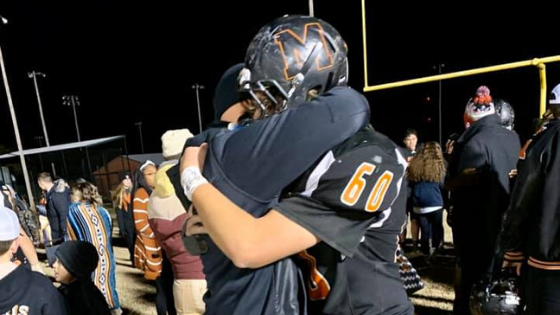“Daddy, can we be tigers?” her auburn pigtails bounced when my two-year old baby girl reached up from the highchair for her father to pick her up. Her pancakes had her attention as syrup dripped from her little chin, but Daddy was leaving to go grade film after a tough Friday night. It had been a couple rough Friday nights after our Black Diamonds had lost not just to one rival, but two, whose mascots were both Tigers.
“Why do you want to be a Tiger, Big Girl?!”, he brushed a stray strand of hair like spun copper away from her face, kissing her forehead.
Crossing her arms across her tiny chest his baby girl emphatically and without mercy replied, “Because Tigers win.”
“Can’t catch a break in my own home.” My coach let out a deep sigh, setting his daughter back down at her breakfast.
I could not help but laugh a little that morning and still now, twenty-three or so years later. I think about how our daughter humbled her big, burly daddy, cutting him to the quick.
When she was five, she began gymnastics, learning new skills. Her daddy always asked her what she learned after each lesson and soon her reports were weekly stories about how to perform a new skill or how she won the spider walk.
Her daddy, the coach, soon expected these reports. Until one evening after gymnastics, we were unloading the groceries I had grabbed when her dad asked if she won.
Quite flippantly, our girl tossed her ponytail to one side and without commitment offered that she had let someone else win that day. Her father’s voice changed at once from jovial to stern. “Come here, Big Girl.”
She bounced over to the couch, crawled up into her daddy’s lap and he began to explain to her the difference between winning, getting beat, and losing.
It’s a lesson his own high school baseball coach taught his high schoolers. My coach held up his hand, holding his first three fingers together and yet apart from the pinky, telling his daughter to focus on the space created between his pinky and his ring finger as he continued to keep them apart.
He said, “This is the difference between winning and losing,” tracing the V his separated fingers created.
“Everybody wants to win, but only the people who respect this space ever become the pinky. Only players who put in the work, who care more about team than personal stats, who will play every game like it’s for the championship know the difference between winning, losing and getting beaten.
Those fingers grouped together represent people who have no idea how to be victorious, people who are afraid to try, and people who only hope to win. The smallest finger represents a champion and the space in between the fourth and fifth finger makes all the difference.
Work in that space and live the life of a champion—be set apart.”
Please imagine a five-year old baby girl, long red hair pulled back in a ponytail messed by an hour of gym, her green eyes focused deeply upon her daddy’s brown ones.
Her mama is walking through the living room nonchalantly trying to get the father’s attention by holding up 5 fingers, one for each year of the little girl’s sweet life.
My efforts were in vain.
My husband’s words unlocked the competitive spirit within my daughter’s DNA, and she never let anyone win on purpose again in her life—not even her baby brother, four years her junior, bless his heart.
Oh that we could convince every athlete with just one heart-to-heart, that they would trust us the way my baby girl trusts her daddy, that they would play outside of their shoes because their coaches believe they can, that they would buy-in, give-all, and turn-out.
Sometimes, they don’t.
And we lose—and losing cuts our men deeply.
Then it is up to us, we Friday Night Wives, to study that space between the ring finger and the pinky, to remind our coaches about the difference.
The points at the end of a grid-iron match up, nine innings of baseball, four quarters of round balling, or six minutes of grappling determine the victor of one challenge—those challenges command our attention, consume our weeks—but as important as they are, they are not the difference.
The difference lies in the example these men set—investing in an ideal greater than oneself—devotion to a brotherhood, sacrifice of self, and the promotion of team. Ideas that young men and women take into adulthood.
Ideas that separate champions from everyone else.
Yes, we step into that space and remind our men of the kids who do listen … of the kids who become adults and still reach out … of the kids who needed a surrogate father … of the kids who played out of their shoes … of the kids who just need one caring adult and our men stepped into the space, the space between winning and losing—and that made all the difference.
#golighttheworld

